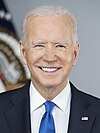Cannabis policy of the Joe Biden administration
| ||
|---|---|---|
|
show
47th Vice President of the United States Incumbent show
Presidential campaigns show
Vice presidential campaigns Published works
 |
||
U.S. President Joe Biden stated in February 2021 that his administration will pursue cannabis decriminalization as well as seek expungements for people with prior cannabis convictions.[1]
Background[]
The use, sale, and possession of cannabis over 0.3% THC in the United States, despite state laws, is illegal under federal law. As a Schedule I drug under the federal Controlled Substances Act of 1970, cannabis over 0.3% THC (legal term marijuana) is considered to have "no accepted medical use" and have a high potential for abuse and physical or psychological dependence. Cannabis use is illegal for any reason, with the exception of FDA-approved research programs; however, individual states have enacted legislation permitting exemptions for various uses, mainly for medical and industrial use but often also recreational use.[citation needed]
Cannabis policy of Donald Trump[]
The Donald Trump administration took positions in favor of marijuana entrepreneurship and pledged to the easing of laws regarding marijuana. Trump indicated during his 2016 presidential campaign that he favored leaving the issue of legalization of marijuana to the states, his administration never acted on the federal prohibition of cannabis, and Trump's 2021 fiscal budget proposal included less protections for state medical marijuana laws. In 2018, every known byproduct of cannabis (excluding Delta-9 THC) was legalized by the Trump administration. In 2018, Trump's administration also rescinded the 2013 Cole Memorandum, an Obama-era Justice Department policy that generally directed federal prosecutors not to pursue cannabis prosecutions in states where the drug is legal as a matter of state law.[citation needed]
2020 state legalizations[]
Cannabis legalization was approved via November 2020 ballot measures in the four states of Arizona, Montana, South Dakota, and New Jersey. Additionally, medical cannabis was legalized via ballot measures during the same election in Mississippi and South Dakota; South Dakota became the first state to legalize medical and recreational cannabis simultaneously. Observers noted that cannabis legalization was approved in states with both conservative and liberal electorates, making it one of the few issues to gain broad bipartisan support in an otherwise highly divisive election.[2] The trend continued in 2021, as legalization was approved at the state level in Biden-carried states of New Mexico, New York, Virginia, New Jersey, and Connecticut.[3] During his 2020 presidential campaign, Biden claimed "individual states should decide whether to legalize it for recreational use."[4]
Cannabis policy[]
As of January 2021, although Biden had stood for decriminalization and descheduling during his campaign, the administration had not formulated an explicit policy on cannabis. Some political and cannabis industry observers like the editor of Leafly thought the administration would be likely to assist in carrying out his campaign promises on cannabis through the MORE Act, sponsored by then-Senator Kamala Harris, or through executive order.[5] Failing full legalization, he could improve banking access by supporting the SAFE Act.[6][7]
In May 2021, the Drug Enforcement Administration approved licensed facilities to grow cannabis for the purpose of medical research for the first time since 1968.[8] Prior to this, the University of Mississippi was the only institution in the United States legally permitted to grow the plant for that use. Previously, in 2016, an application process was put in place for research growers, but no applications were later approved under the Trump administration.[9]
References[]
- ^ Rose, Connor J.; Steineker, Whitt (December 28, 2020). "President-Elect Joe Biden and the Future of Cannabis Policy in America". Bradley. Retrieved July 8, 2021.
- ^ "Marijuana legalization is so popular it's defying the partisan divide". CBS News. The Associated Press. November 16, 2020. Retrieved July 8, 2021.
- ^ Wong, Ashley (June 22, 2021). "Connecticut Legalizes Recreational Marijuana, With Sales Aimed for 2022". The New York Times. ISSN 0362-4331. Retrieved June 28, 2021.
- ^ Craig, Tim (January 11, 2021). "Biden, once a warrior in the 'war on drugs,' may slowly retreat". The Washington Post. Retrieved July 8, 2021.
- ^ Berke, Jeremy (January 20, 2021). "Here's why Biden's presidency will be good for the US cannabis industry, even though it's unlikely he'll legalize marijuana federally". Business Insider. Retrieved July 8, 2021.
- ^ Perel, Larry (January 22, 2021). "Bud under Biden: What will be the new president's policies on cannabis". KCRW. Retrieved July 8, 2021.
- ^ Medrano, Kastalia (January 20, 2021), "The Biden Administration and Drug Policy: Expectation Versus Reality", Filter, retrieved July 8, 2021,
We know Biden's public stance on [marijuana policy]. He's spoken about decriminalization, about medical legalization, about moving marijuana from its current classification as a Schedule I drug under the Controlled Substances Act (using executive action to bring it down to Schedule II) and about expunging past convictions for marijuana charges. But he's never come out in favor of full descheduling and full legalization.
- ^ Wadman, Meredith (May 17, 2021). "United States set to allow more facilities to produce marijuana for research". Science.
- ^ Gurman, Sadie (May 14, 2021). "Marijuana Medical Research Growers Receive U.S. Approval". The Wall Street Journal. Retrieved 20 May 2021.
- Cannabis policy by United States presidential administration
- Policies of Joe Biden



